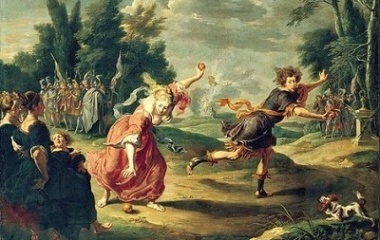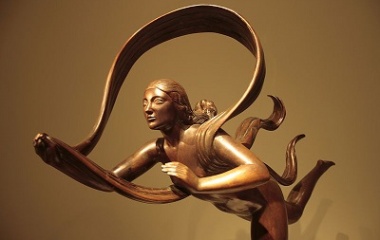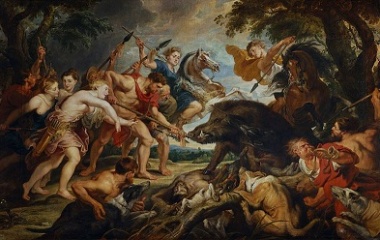- Pronunciation: at-al-an-tuh
- Origin: Greece
- Role: Huntress
- Symbol: Golden Hair
- Parents: Iasus, Boeotia
- Husband: Hippomenes
- Children: Parthenopaios
Who Is Atalanta?
The abandoned child of an Arcadian king, Atalanta is rescued by a bear in the wild, then adopted by hunters. She grows to be both a beautiful woman and a skilled huntress. As a devout follower of Artemis, the virgin goddess of the hunt, Atalanta too decides to remain a virgin by any means necessary.
The myths of Atalanta are adventure filled as she protects her chastity against aggressive suitors, becomes the only woman on the Quest for the Golden Fleece with Jason and the Argonauts, and kills a huge boar wreaking havoc on Calydon. The determined and talented huntress is eventually reunited with her father and gives up her single life at his request, but not before orchestrating a challenge for the men who want her hand.
Origin
King Iasus of Arcadia was disappointed when his daughter was born as he would have preferred a boy child, and for this reason he ordered that the baby Atalanta be abandoned in the wilderness. According to the legend, a mother bear finds the infant girl and feeds her bear milk until some friendly hunters come along and take her under their wing. They raise her to be a great huntress.
Atalanta becomes a dedicated follower of Artemis, a chaste goddess, and she too is committed to remaining a virgin. As she grew, so did her beauty, which attracted men of all kinds despite her disinterest. Rhoecus and Hylaeus, two centaurs (half-man, half-horse creatures), tried to forcibly have their way with her. They were no match for the swift and skillful virgin and she killed them both with her arrows.
Later, she is the only woman to accompany Jason and the Argonauts on the famous quest for the Golden Fleece. Atalanta defeats prince Peleus of the island of Aegina at the funeral games for King Pelias in a wrestling match. She is a fierce competitor.
Calydonian Boar Hunt
Near Arcadia was the small city of Calydon, ruled by King Oeneus. His son, the crown prince, was the handsome Meleager who had also been on the quest for the Golden Fleece. During that time he had become quite enamored with beautiful and courageous Atalanta, despite the fact the he already had a wife.
It was customary in Calydon to sacrifice the first fruits of the harvest to the gods as a sign of gratitude and respect. In a quite careless error of omission, King Oeneus did not include the goddess Artemis in the offerings. The offended goddess sent an enormous and nasty wild boar to the city and it began to destroy crops and kill cattle.
King Oeneus summoned the bravest and fiercest hunters to fight the boar, including his son Meleager and the seasoned huntress Atalanta. The skin of the boar would be the prize for the hunter who could kill it. Many of the men weren’t thrilled to be fighting alongside a woman, but Meleager insisted on her inclusion and the hunt began.
Atalanta was the first to shoot but the beast was huge and it would take more than one arrow to kill it. Meleager speared the boar and came within inches of being killed himself by the wild beast, but eventually he was triumphant and was awarded the hide, which he promptly gifted to Atalanta. His uncles, who had also participated in the hunt, were annoyed that the prize was going to a woman. They declared that if Meleager didn’t want to keep the hide, then they were in line for the prize and tried to snatch it from Atalanta. In a fit of rage, Meleager killed the two big-mouthed uncles. His mother, the queen, was devastated by the death of her brothers and threw a magical log on a fire that consumed her love-struck son. According to the legends, it had been previously determined by the Fates (the three mythological incarnations of destiny) that Meleager would die if the special log was ever burnt. A sad ending for the prince, and for his mother as another boar emerged from the forest and trampled her.
The Race
After the boar hunt, Atalanta had become a famed Calydonian huntress and, due to her celebrity status, not surprisingly, her father the Arcadian king Iasus who had abandoned her for being female, showed up to reunite with his daughter. Atalanta agreed to return to her father’s home, with the condition that she could remain a virgin. But endless suitors were coming to ask for her hand in marriage and the king soon changed his mind and insisted she choose a husband.
Atalanta reluctantly agreed, but she would require a man who could outrun her in a race – not an easy feat, as she was so quick. The caveat was that any loser would be killed. Well, as young men often do, they lined up to take their chances, and quite a few runners for love ended up dead, until Hippomenes came along. A pretty crafty guy, with his eye on the bridal prize, he called upon the goddess Aphrodite to assist him.
Aphrodite, the goddess of love, was naturally not a big fan of virgins, and agreed to help. She gave Hippomenes three irresistible golden apples. Apples of this sort are on ongoing theme in Greek mythology; both gods and mortals covet them and Atalanta was easily susceptible to their trick. Every time she took the lead in the race, Hippomenes would toss a golden apple and she would run off course to chase it down. He won the race with this scheme and the two married and later had a son named Parthenopaios.
Hippomenes, however, in his excitement, forgot to thank the goddess Aphrodite for her help. This was not a brilliant move, as goddesses preferred to be appreciated. She made Hippomenes become so overcome with lust that he took Atalanta the next moment he sees her, which happened to be in Zeus’s temple.
It was believed back then that lions could not mate with their own species, only with leopards. As their punishment for their disrespectful acts they were both turned into lions so they could never mate again. Depending on the version of the tale in question, either Zeus or Aphrodite was responsible for this transformation. Either way, the fate of Atalanta and Hippomenes was the same: to live out their lives as lions unable to come together ever again.
Modern Influence
Marlo Thomas featured the story of Atalanta in a children’s entertainment project, Free to be You and Me in 1974. The seventies were an age of rising awareness and promises of gender equality. The collaboration with the Ms. Foundation included a book, an album and a television special and starred many celebrated stars of the day, including Michael Jackson, Alan Alda and Cicely Tyson. The message was clear that all children, boys and girls are capable of achievement and expressing individuality is positive.
We can consider Atalanta the ancient inspirational character who showcases the spirit of strong brave girls and capable women. She broke through stereotypes in ancient Greece way before the term feminism existed. The next time you see a female runner, think of Atalanta running like the wind, her essence flowing forward through the centuries still liberating women to activate their competitive energy.










